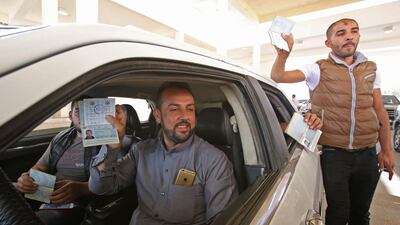A vital border crossing between Jordan and Syria reopened on Monday for the first time in three years, promising to restore trade and movement between the two countries that had halted because of the war.
Another crossing, between Syria and the Israeli-occupied Golan Heights, also reopened for UN observers who had left the area four years ago because of fighting there.
The reopening of the crossings is a major boost to the Syrian government of President Bashar Assad, restoring a commercial lifeline to the outside world. It also reinforces the Syrian government's message that it is slowly emerging victorious from the seven-year conflict.
The Syrian flag was raised at the Quneitra crossing between Syria and the Israeli-held Golan.
UN observers and local notables from the Druze community, the predominant population in the area, gathered near the crossing. The UN observers had left the Quneitra crossing in 2014 for the first time since deploying there in 1974 to monitor a cease-fire and a demilitarized zone.
"It is a day of victory," Youssef Jarbou, a Druze leader, told the Syrian Al-Ikhbariya TV from Quneitra.
Syrian forces recaptured the Quneitra area in July. Russian military police deployed in the area, including on the edge of the Israeli-occupied Golan Heights, setting up checkpoints in the area. Moscow said it planned to work closely with the UN force.
Meanwhile, at the Naseeb crossing between Syria and Jordan, dozens of private cars lined up to cross from Jordan. Security personnel and dogs searched the vehicles.
"Today is a feast, a feast for the whole Arab and Islamic nations and for the whole World, this crossing is vital for the whole Arab countries," said Mohammed Khalil, the first Syrian in line waiting to cross back into his country.
Naseeb's reopening would bring major financial relief to Assad's government by restoring a much-needed gateway for Syrian exports to Arab countries. The resumption of commercial trade through the crossing will also be a diplomatic victory for Assad, whose government has been isolated from its Arab neighbours since the war began in 2011.
Arab countries have boycotted the Syrian government since the early days of the war, freezing its membership in the 22-member state Arab League.
"The Naseeb crossing is a vital lifeline for trade between the two brotherly countries Jordan and Syria through them to other Arab countries," Jordan government spokeswoman Jumana Ghunaimat said.
Syrian rebels seized the crossing in 2015, disrupting a major trade route between Syria and Jordan, Lebanon and oil-rich Gulf countries.
Syrian government troops recaptured it in July, after rebels reached an agreement with Russian mediators to end the violence in the southern province of Daraa and surrender the crossing.
The crossing is also vital for Syria's neighbour Lebanon, providing its agricultural products a route to foreign markets.
The recapture of Naseeb marked a major victory for Assad's forces, which have been on a winning streak since 2015 when Russia threw its military weight behind Damascus. The victory in southern Syria signalled the return of his forces to Daraa province where the uprising against him began seven years ago.

